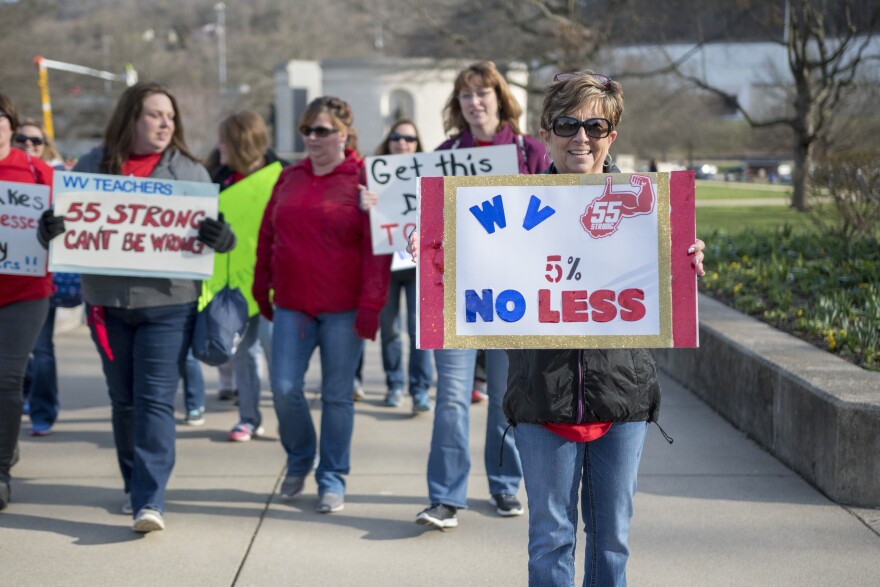Teachers in Arizona are protesting for higher pay, while Kentucky educators rallied at their state capitol this Friday. The same day, Oklahoma teachers ended a 9-day walkout, rivaling the length of time West Virginia teachers left their classrooms last month. Distressed teachers seeking higher pay and better funding for education have created a movement in red states, leaving some to wonder, will North Carolina teachers join in next?In an article published Friday, Michael Hansen, an education researcher from the Brookings Institute, singled out Mississippi and North Carolina as two states that have a lot in common with the four states where simmering teacher complaints have boiled over into statewide action.
Hansen says there are four common themes among states with recent teacher protests:
- Teacher salaries well below the national average;
- Inflation-adjusted salaries that remain below pre-recession levels and the national average;
- Per-pupil spending that remains below pre-recession spending;
- The state Legislature largely controls teacher salary schedules.
All of these factors are true in North Carolina.
The state’s average teacher salary has inched up in recent years, but the National Education Association ranked it near the bottom of the barrel in 2016, at No. 41 among U.S. states and the District of Columbia.
Inflation-adjusted salaries are down 5 percent and per-pupil spending is down about 12 percent in North Carolina, according to Hansen’s research. And the North Carolina General Assembly sets teachers’ base salaries. Teachers do not have collective bargaining rights in North Carolina, and that gives state legislators wide control over their salaries.
“If the state Legislature determines your salary schedule, it’s much more effective to change your salary by converging on the state capitol,” Hansen explained.
North Carolina teachers are planning to do just that on the opening day of the Legislature’s spring session on May 16.
“We are encouraging all of our school employees to come there if they can,” said Mark Jewell, President of the North Carolina Association of Educators. But he added, the group encourages teachers to use personal leave to attend. “It is not a walk out, and it is not a sick out,” he said.
The North Carolina Association of Educators is the state’s largest public school organization and the main lobbying group for teachers. Jewell said the group has been closely monitoring what is going on across the country.
“This is what I’m referring to as a red state revolt,” Jewell said.
While the country is witnessing a major movement among teachers, Jewell said teachers’ complaints in North Carolina are nothing new. He points to major education funding cuts following sizable tax cuts in 2013. Thousands of teacher positions were eliminated at that time, including teacher aides and support services like school nurses and psychologists that legislators are now learning are well below national position-to-student ratios. Funding for teachers and schools has not fully recovered since the recession.
The state has improved education funding in recent years. The state Department of Public Instruction reported earlier this year that average teacher pay in the state had broken the $50,000 threshold. And DPI has doled out thousands of performance-based bonuses in recent years to certain teaching positions. Jewell says those facts can be misleading.
“There have been some pay raises over the past couple of years, but they have not been distributed fairly,” Jewell said. “We have a broken salary schedule right now that starts at $35,000 and ends at $51,300.”
The salary range Jewell refers to is a base pay for a teacher with a bachelor’s degree -- in 2013, the state eliminated higher pay schedules for new teachers receiving master’s degrees. Jewell said the current average pay can be attributed to substantial local supplements in some school districts coming from county coffers, and from Baby Boomer teachers nearing retirement whose salaries and benefits were grandfathered in from earlier policies.
Jewell said the NCAE’s strategy is not set on striking, but rather, on voting.
“Our goal is to make sure that in November, that we are going to go to the polls in mass numbers, and vote out the people who have made these horrific cuts and to elect pro-public education [candidates],” Jewell said.
Pro-public education advocates have their sights set on Democrats breaking the Republican super-majority in the Legislature, to give Democratic Governor Roy Cooper more bargaining power of his own when it comes to education policy. Jewell said teachers are well aware of the action in other states, and he expects that to fuel a march to the ballot box.
“They’re watching what’s going on in West Virginia and the mobilization in Oklahoma and now in Kentucky and Arizona,” Jewell said. “So the frustration is real out there.”











